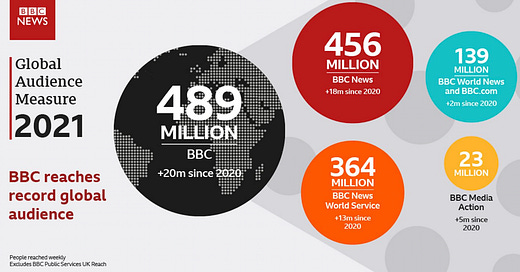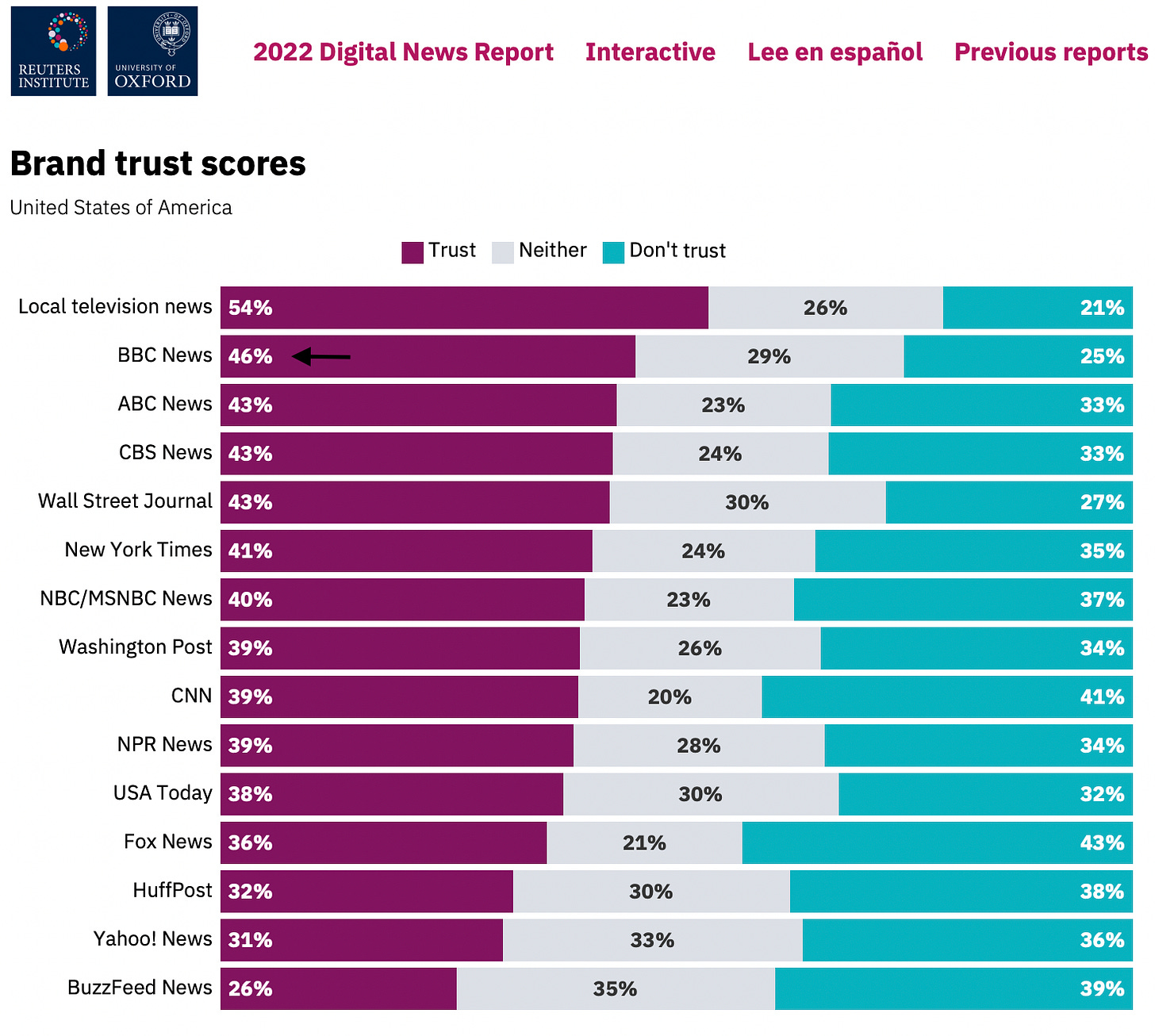Why is the BBC the Most Trusted News Brand in America?
Because lots of Americans desperately want nonpartisan news sources.
Last week we examined the abysmal level of trust in news among Americans, highlighting how the U.S. is tied for the lowest news trust in the world. Diving deeper into this fascinating 2022 study by the Reuters Institute and YouGov, another research finding stands out: Beyond local television news, which is the most trusted by Americans, BBC News is the most trusted news brand in America, scoring slightly above all other major U.S. news organizations.
A few caveats are in order before examining this finding in more detail. First, this list does not include a full accounting of all news brands available in the United States—for example, PBS (whose local stations often partner with the BBC for distribution in America) and The Economist are not included here yet both traditionally receive high marks for trustworthiness from Americans. Additional YouGov data and other brand research projects with more complete lists, however, also show the BBC on top or near the top in terms of overall news trust in America.
Second, the differences in trust presented here are relatively small among the top performing brands which include ABC News, CBS News, and The Wall Street Journal along with the BBC. America has numerous high quality news organizations that perform vital functions reporting on national and international events, carrying out investigations of important topics, and offering informed analysis of policy and politics. These small trust differences in one survey do not diminish their work in any way.
With these research cautions in mind—and setting aside the allure of British accents to American ears—it’s worth considering: Why is the national broadcaster of the United Kingdom one of the most trusted news brands in America?
The Reuters study does not fully address this question, but two hypotheses are plausible:
(1) BBC News is most trusted in America because it has the largest reach globally. BBC News is estimated to have reached close to 500 million people each week across the globe in 2021-2022. No other news organization touches as many people worldwide as does the BBC. BBC News covers government, politics, world conflicts, science, business, education, arts, and culture from more than 150 countries with news gathering operations in 41 overseas news bureaus and 7 in the UK and Ireland.
The general assumption about Americans is that they are solipsistic bores who are uninterested in the rest of the world. Perhaps it’s time to put this caricature out to pasture. The BBC’s own internal audience measures in 2020-2021 found a more than 30 percent increase in BBC consumption in America with BBC News across all platforms reaching nearly 50 million Americans. The United States emerges as the second highest audience for the BBC outside of the UK—second only to India, a nation with more than one billion people.
As many U.S. news organizations have curtailed costly international reporting, millions of Americans increasingly turn to the BBC for reliable coverage of global affairs and events in other parts of the world—especially as more of these events impact U.S. life and vice versa.
(2) BBC News is most trusted in America because it’s viewed as a nonpartisan news source in a highly polarized environment. Beyond its global reach, the BBC offers something very important to American audiences—a seemingly neutral voice without obvious partisan leanings or interests one way or another. As American media has fractured into numerous closed-loop partisan propaganda and opinion machines, lots of people are looking for an alternative that basically just presents facts and reporting without all the ideological baggage.
UK audiences may disagree about the perceived political leanings of the BBC, and conservatives and liberals may disagree about some of its content choices, but you’d be hard pressed to say the BBC in America does the bidding of either Democrats or Republicans.
A typical BBC segment on television or the radio includes a no-nonsense tour of the most important events around the world, and in America, delivered in a straightforward manner mostly without commentary. Longer segments and analyses tend to include voices from across the ideological spectrum interviewed in a respectful if sometimes firm manner to ensure people can back up their claims and arguments with evidence. Compare that to a typical U.S. cable news or radio segment, or many daily newspapers, which are too often filled with dumb cultural features, ideological commentary, and partisan actors pontificating about things they often don’t understand.
It certainly helps that the BBC offers an outsider’s view of America and the world mostly free from the interminable partisan battles and culture wars that degrade U.S. current affairs programming. If you’re an American looking for solid information about the country and the world, delivered mostly straight and without an agenda, the BBC is a good choice.
American news organizations are free to spread their wings to report more from around the world. But the financial costs of running an operation of this magnitude surely will require increased philanthropic or independent government financing.
Perhaps the new bipartisan cooperation on countering China and its massive propaganda efforts will encourage lawmakers to reconsider the importance of the U.S. itself funding and supporting an independent English-language global news organization, like the BBC, dedicated to collecting and reporting information about governments, economics, and society to those around the world. The goal of this operation should not be to promote the interests of Democrats or Republicans in office but rather to provide citizens here and abroad with a neutral and nonpartisan examination of the world’s most important developments. We have good current models like this in Voice of America and Radio Free Europe, plus the solid news programming on PBS and NPR, that could be expanded into a full-fledged global operation with more dedicated funding and transparent oversight to maintain trust with the public.
Since neither of these private or public sector options seem possible anytime soon, BBC News is likely to continue growing and deepening its reach in America as more citizens search for regular and reliable coverage of world events presented in a nonpartisan manner. Or as the Royal Charter that establishes and sustains the BBC mission states: “[T]o act in the public interest, serving all audiences through the provision of impartial, high-quality and distinctive output and services which inform, educate and entertain."






